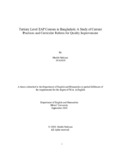| dc.contributor.advisor | Amin, Md. Al | |
| dc.contributor.author | Nahiyan, Sheikh | |
| dc.date.accessioned | 2021-05-22T06:53:31Z | |
| dc.date.available | 2021-05-22T06:53:31Z | |
| dc.date.copyright | 2020 | |
| dc.date.issued | 2020-09 | |
| dc.identifier.other | ID: 19163010 | |
| dc.identifier.uri | http://hdl.handle.net/10361/14413 | |
| dc.description | This thesis report is submitted in partial fulfilment of the requirements for the degree of Masters of Arts in Teaching to Speakers of Other Languages, 2020. | en_US |
| dc.description | Cataloged from PDF version of thesis. | |
| dc.description | Includes bibliographical references (pages 53-58). | |
| dc.description.abstract | The essentiality of undergraduate EAP courses is that they are necessary to improve students’
English language proficiency for academic and professional purposes. Higher education
institutions in Bangladesh are continuously changing to improve their quality of education, but
their overall development efforts do not specify how it contributes to the improvement of the
EAP courses. Although local research has pointed out the need for EAP courses and the
shortcomings that current EAP courses have. Therefore, an overall needs-based evaluation of the
EAP courses is imperative to map its specificity. Also, undergraduate curricular reform through
the adoption of the OBE learning model will have a substantial effect on EAP education in
universities. Moreover, Bangladeshi universities have been trying to secure a commendable
place in global university rankings in recent years through multifaceted activities. Yet, at the core
of the success of universities and its learners lies higher language proficiency levels as English is
the global language of academia, business, communication, and research. For that reason, a
specific EAP accreditation, in addition to the reevaluation of the EAP courses can contribute to
the overall outcome-based goals of the university. In comparison to other research works on
university EAP courses, this research used a qualitative framework to sketch the overall picture
of current EAP practices and future potential of EAP courses. This was done by documenting
university students’ and teachers’ experiences and opinions of doing EAP courses, EAP
teachers’ views about current higher education improvement projects, scopes of pursuing an
international EAP accreditation parallel to the OBE curriculum and how the overall quality of
higher education can be promoted | en_US |
| dc.description.statementofresponsibility | Sheikh Nahiyan | |
| dc.format.extent | 58 pages | |
| dc.language.iso | en_US | en_US |
| dc.publisher | Brac University | en_US |
| dc.rights | Brac University theses are protected by copyright. They may be viewed from this source for any purpose, but reproduction or distribution in any format is prohibited without written permission. | |
| dc.subject | EAP | en_US |
| dc.subject | English language learning | en_US |
| dc.subject | HEQEP | en_US |
| dc.subject | BALEAP Accreditation | en_US |
| dc.subject | EAP Accreditation | en_US |
| dc.subject | Medium of instruction | en_US |
| dc.subject | EMI | en_US |
| dc.subject | OBE Model | en_US |
| dc.subject | Bloom’s Taxonomy | en_US |
| dc.subject | Higher Education Institutions | en_US |
| dc.title | Tertiary level EAP courses in Bangladesh: A study of current practices and curricular reform for quality improvement | en_US |
| dc.type | Thesis | en_US |
| dc.contributor.department | Department of English and Humanities, Brac University | |
| dc.description.degree | M. in English | |

